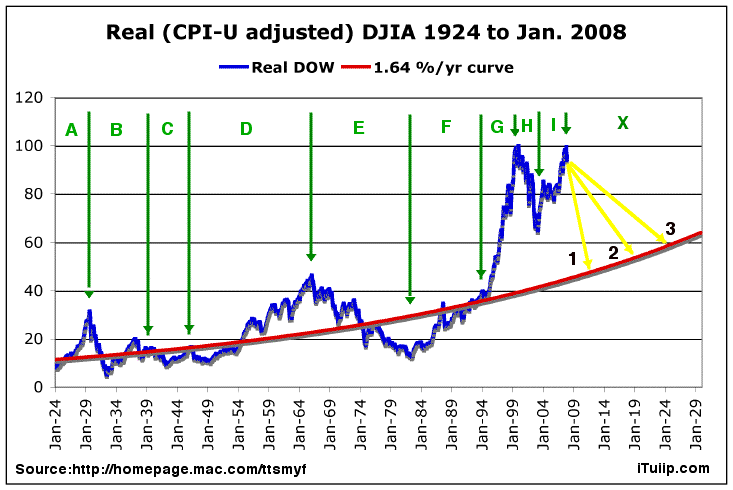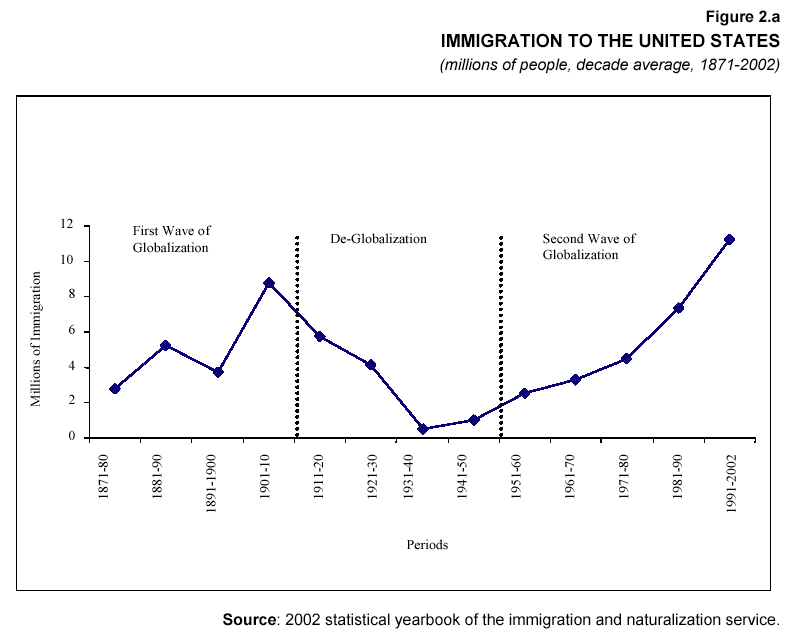 |
Jan. 28, 2008 (Paul B. Farrell - MarketWatch)
In America, land of the bubbles, the next pop will be the biggest
Actually it's the 1919 tune that launched the roaring run-up to the '29 crash and the Great Depression. Remember the lyrics: "I'm forever blowing bubbles. Pretty bubbles in the air. They fly so high, nearly reach the sky. Then like my dreams they fade and die."
And it still fits today! Listen to venture capitalist Eric Janszen's scary new paradigm in "The Next Bubble," a Harper's Magazine report: "That the Internet and the housing hyperinflations transpired within a period of 10 years, each creating trillions of fake wealth, is, I believe, only the beginning."
[snip]
Never-ending: Gross and Janszen agree on that. But they're both wrong. The biggest low in Janszen's argument: "Given the current state of our economy, the only thing worse than a new bubble is its absence."
Wrong, wrong, wrong! Remember, this new paradigm assumes that the only way the American economy can exist in the future is if Wall Street's greedy "bubble-blowing machine" keeps feeding on itself, creating an endless, accelerating succession of ever-bigger bubbles.
Folks, that's one of the dumbest economic theories ever, silly "new age" magical-thinking touted as a scientific basis for the new self-indulgent ideology of Wall Street, Washington and Corporate America.
AntiSpin: Apparently Paul B. Farrell has never read iTulip.com. EJ is an entrepreneur first, VC second. The Next Bubble argument is to turn the entrepreneur, financing, and economic machine to a constructive purpose. The alternative is a mix of 1930s USA, 1990s Japan, and 1920s Germany.
Here's where we stand.

We define the ten periods shown as compared to periods of inflation adjusted DJIA growth and decline as follows:
A. Globalization V1.0 and FIRE Economy V1.0.
B. Failure of FIRE Economy V1.0 and Globalization V1.0 (global economic depression and de-globalization).
C. World War II (drawn out and self-reinforcing global depression across elections influences political outcomes).
D. Start of Globalization V2.0 (rise of the US industrial economy).
E. Decline of US industrial economy.
F. FIRE Economy V2.0 starts in 1980 (first crisis, real estate and banking early 1990s).
G. FIRE Economy V2.0 experiences first asset hyperinflation (equity financed in tech companies).
H. FIRE Economy V2.0 second crisis (stock market crash).
I. FIRE Economy V2.0 second asset hyperinflation (debt financed in housing and businesses.).
X. FIRE Economy V2.0 final crisis (real estate market crash. "Period X" current.
Scenarios of the Real DJIA returning to the real 1.64% mean curve via rising inflation and nominal price declines are:
1. 2012 - Fast 50% real decline via very high inflation.
2. 2020 - Moderate 45% real decline via high inflation.
3. 2025 - Slow 40% real decline via very moderate inflation.
Looking out the next few years, here's how it looks.
1) Jan. 2008: We're in the early innings of the US debt deflation; think: Japan 1990.
2) Jun. 2008: The US is in recession and evidence mounts that the first true demand crisis in the US since the early 1980s is in train.
3) Jan. 2009:
- USA: Republicans blamed for the recession so a Democrat won the presidential election in Nov. Taxes are not raised. Government spending increases. Foreign lending has dropped, the dollar has continued to depreciate, import prices rise which increases inflation pressures.
- EU: Most of Europe is in recession. The ECB was slow to see the risks of deflation and worried too much about inflation, as the Japanese did in the early 1990s. Without a euro treasury department to inflate the euro through bond issuance and monetization, a deflation process takes hold and interest rates march relentlessly to the zero bound. The euro strengthens. At the same time, tension among UE members increases as recessions impact different countries in different ways. Countries such as Spain are under intense political pressure to enact stimulus that is contrary to ECB rules. Countering the euro strengthening trend are political stresses on euro zone unity.
- Asia: China's GDP growth slows to 3%. Feels to the average Chinese like a serious recession. Unemployment rises and with it political strife. The CCP clamps down hard on dissident groups. Increasing political instability feeds negatively back into financial markets and the economy. Other nations, such as Japan, that are dependents on China for demand enter deep recession and suffer political problems of their own.
4) Jun. 2009: Governments around the world cope with the first global recession since the early 1980s, with rising unemployment and political unrest. In some countries, bad ideas start to gain ground and are picked up by populist leaders looking to replace incumbents: protectionism in the US, counter-protectionism in Asia, Islamic militancy in the Middle East and parts of Europe, and so on. Initially, relationships between long standing contacts among central bank officials holds together. But as elections occur, CB officials that represented the previous administrations are placed with new faces. Soon a new regime is in place.
5) Jan. 2010: A period of heavy global election activity occurred in the 2008 to 2010 period. If these elections occurred in an environment of ongoing or increasing economic and political trouble or even chaos, then the a De-Globalization process may begin.
The outcome of the process of debt deflation and recession depends on how deep the global recession goes and how long it lasts. If it goes on long enough to impact elections around the world, then we may begin a process of De-Globalization. If the recession is short, then the system holds with no major political and economic re-alignments. The process of globalization and de-globalization is apparent in immigration trends.

Guys like Farrell may not know it but are asking for "Period X" to be another period of de-globalization like the one between 1932 and 1950. No thanks. Here's an alternative.
My philosophy is that it’s not enough for me to identify how screwed up things are and how bad things are going to get if I don’t also have any constructive solutions to offer, and that’s really what the Harper’s article is all about. As the economy and financial markets devolve over the next few years, we all going to be looking for ways to get things going again and I’m hoping we go the re-industrialization route without the global depression, de-globalization, and war that followed the collapse of the last major debt financed asset price inflation, back in the 1920s. To help readers see what I see, I ask a number of questions.
Why can’t the US have the best auto industry in the world, leading with the best next generation technology? Why not build a national high speed rail network where you can work as if you’re in your office as you head to Texas, Florida, Chicago, or California from Boston or New York? Why not build safe and simple pebble bed nukes for local electricity and hydrogen fuel production for local personal transportation and wean ourselves off imported fossil fuels? Why not install fiber to ever home to enable communication tools that vastly reduce the need for in-person contact and commuting.
These are the kinds of energy, transportation, and communications projects I have in mind, massive investments to make the US economy more efficient for private businesses. Get government out of the business of subsidizing industry directly as it does the real estate industry today. Participants are government, private industry, private equity, and Wall Street. Capital gains tax rate on private company investment? Zero. If as an entrepreneur you’re taking all the risk to compete to, say, make the best ceramics technology for the high temperature turbines for the new nukes, you and your investors should not pay any capital gain taxes if the bet wins. How to make up for the tax revenue shortfall? Shift taxes back onto the FIRE Economy, especially real estate and other non-productive assets. The economy will shift its focus from debt-financed consumption to equity financed production.
The FIRE Economy V2.0 is as good as over anyway. Farrell thinks we can go from FIRE Economy to zero cold turkey. That proves he has no idea how the economy actually works.
See also: The Big Bet
iTulip Select: The Investment Thesis for the Next Cycle™
__________________________________________________
To learn about the Next Bubble, sign up for one year of iTulip Select by January 15 and receive the February 2007 issue of Harper's Magazine with Eric Janszen's cover article The Next Bubble free.
For the safest, lowest cost way to buy and trade gold, see The Bullionvault
To receive the iTulip Newsletter or iTulip Alerts, Join our FREE Email Mailing List
Copyright © iTulip, Inc. 1998 - 2007 All Rights Reserved
All information provided "as is" for informational purposes only, not intended for trading purposes or advice. Nothing appearing on this website should be considered a recommendation to buy or to sell any security or related financial instrument. iTulip, Inc. is not liable for any informational errors, incompleteness, or delays, or for any actions taken in reliance on information contained herein. Full Disclaimer

Comment